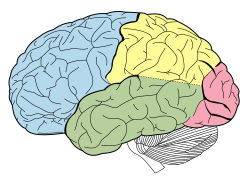Temporal lobe epilepsy

Editor-In-Chief: Prab R Tumpati, MD
Obesity, Sleep & Internal medicine
Founder, WikiMD Wellnesspedia &
W8MD's medical weight loss NYC, sleep center NYC
Philadelphia medical weight loss and Philadelphia sleep clinics
| Temporal lobe epilepsy | |
|---|---|

| |
| Synonyms | N/A |
| Pronounce | N/A |
| Specialty | N/A |
| Symptoms | Seizures, auras, memory loss, déjà vu, jamais vu |
| Complications | N/A |
| Onset | Typically childhood or adolescence |
| Duration | Chronic |
| Types | Mesial temporal lobe epilepsy, Neocortical temporal lobe epilepsy |
| Causes | Brain injury, infections, genetic factors |
| Risks | Family history, head trauma, febrile seizures |
| Diagnosis | EEG, MRI |
| Differential diagnosis | Other types of epilepsy, psychogenic non-epileptic seizures |
| Prevention | N/A |
| Treatment | Anticonvulsants, surgery, vagus nerve stimulation |
| Medication | N/A |
| Prognosis | Varies; some achieve seizure control, others may have intractable epilepsy |
| Frequency | Common |
| Deaths | N/A |
Temporal lobe epilepsy (TLE) is a chronic neurological condition characterized by recurrent, unprovoked seizures originating in the temporal lobe of the brain. It is the most common form of focal (or partial) epilepsy and represents approximately 60 percent of all patients with epilepsy.
Symptoms[edit]
The symptoms experienced during a seizure will depend on the specific area of the brain where the seizure begins. In TLE, seizures often involve feelings of fear, anxiety, or a sense of déj√† vu. Other symptoms can include sensory changes, such as visual disturbances or changes in hearing, smell, taste, or touch.
Causes[edit]
TLE is often associated with a brain abnormality, such as hippocampal sclerosis, which is a specific pattern of hippocampal cell loss. Other causes can include brain injury, infection, or abnormal blood vessels. However, in many cases, the cause of TLE is unknown.
Diagnosis[edit]
Diagnosis of TLE typically involves a detailed medical history and neurological examination, as well as tests such as an electroencephalogram (EEG) to measure electrical activity in the brain, and imaging studies such as magnetic resonance imaging (MRI) to identify any structural abnormalities.
Treatment[edit]
Treatment for TLE typically involves medication to control seizures. In some cases, surgery may be considered if medication is not effective.
Prognosis[edit]
The prognosis for individuals with TLE varies. Some individuals may have good seizure control with medication, while others may continue to have seizures despite treatment.
Gallery[edit]
-
Cajal's drawing of the hippocampus
-
MRI image of the hippocampus
-
PET scan of a normal brain
-
Surgery in progress for epilepsy treatment
-
Vagus nerve stimulation device
-
Deep Brain Stimulation (DBS) in pediatrics
See also[edit]
Ad. Transform your life with W8MD's Budget GLP-1 injections from $75


W8MD offers a medical weight loss program to lose weight in Philadelphia. Our physician-supervised medical weight loss provides:
- Weight loss injections in NYC (generic and brand names):
- Zepbound / Mounjaro, Wegovy / Ozempic, Saxenda
- Most insurances accepted or discounted self-pay rates. We will obtain insurance prior authorizations if needed.
- Generic GLP1 weight loss injections from $75 for the starting dose.
- Also offer prescription weight loss medications including Phentermine, Qsymia, Diethylpropion, Contrave etc.
NYC weight loss doctor appointmentsNYC weight loss doctor appointments
Start your NYC weight loss journey today at our NYC medical weight loss and Philadelphia medical weight loss clinics.
- Call 718-946-5500 to lose weight in NYC or for medical weight loss in Philadelphia 215-676-2334.
- Tags:NYC medical weight loss, Philadelphia lose weight Zepbound NYC, Budget GLP1 weight loss injections, Wegovy Philadelphia, Wegovy NYC, Philadelphia medical weight loss, Brookly weight loss and Wegovy NYC
|
WikiMD's Wellness Encyclopedia |
| Let Food Be Thy Medicine Medicine Thy Food - Hippocrates |
Medical Disclaimer: WikiMD is not a substitute for professional medical advice. The information on WikiMD is provided as an information resource only, may be incorrect, outdated or misleading, and is not to be used or relied on for any diagnostic or treatment purposes. Please consult your health care provider before making any healthcare decisions or for guidance about a specific medical condition. WikiMD expressly disclaims responsibility, and shall have no liability, for any damages, loss, injury, or liability whatsoever suffered as a result of your reliance on the information contained in this site. By visiting this site you agree to the foregoing terms and conditions, which may from time to time be changed or supplemented by WikiMD. If you do not agree to the foregoing terms and conditions, you should not enter or use this site. See full disclaimer.
Credits:Most images are courtesy of Wikimedia commons, and templates, categories Wikipedia, licensed under CC BY SA or similar.
Translate this page: - East Asian
中文,
日本,
한국어,
South Asian
हिन्दी,
தமிழ்,
తెలుగు,
Urdu,
ಕನ್ನಡ,
Southeast Asian
Indonesian,
Vietnamese,
Thai,
မြန်မာဘာသာ,
বাংলা
European
español,
Deutsch,
français,
Greek,
português do Brasil,
polski,
română,
русский,
Nederlands,
norsk,
svenska,
suomi,
Italian
Middle Eastern & African
عربى,
Turkish,
Persian,
Hebrew,
Afrikaans,
isiZulu,
Kiswahili,
Other
Bulgarian,
Hungarian,
Czech,
Swedish,
മലയാളം,
मराठी,
ਪੰਜਾਬੀ,
ગુજરાતી,
Portuguese,
Ukrainian








